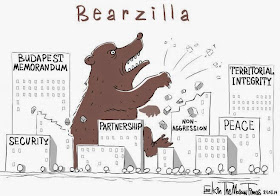The ongoing developments in Ukraine and Russia's aggression and annexation of Crimea, bring again on the spotlight the original ideas of the founding fathers of the European Union: peace, stability and counterbalancing the big powers.
Small individual states can not defend themselves against a global player, like Russia. The Euro-skeptics have long convinced us, after the developments in Yugoslavia and Czechoslovakia, that federations do not work.
These countries are a living proof according to them, that trying to bring different ethnic groups together and uniting them under one government, not only does not bring peace and stability, but it is a time-bomb that could bring on-going conflict.
There is a point in this argument, but they forget one major factor: Russia. During these break-ups, the Russian Bear was recovering from the collapse of the Soviet Union. They did not pose a direct threat to any of Europe's smaller states, but now things have changed.
Russia invaded and annexed Crimea, in an effort to stop the expansion of NATO and EU ever East-wards. A few years ago they entered into a conflict with Georgia, just to show the Bear's teeth. Now, after many decades, they have committed something that was absent from our continent for a long time: ending another country's territorial integrity.
Even worse, many people fear that they won't stop in Crimea, or even Ukraine itself. Other countries with relatively large ethnic Russian minority, like Moldova and the Baltic states, are very wary of the recent developments. Besides, not only they have a Russian minority, but in the case of the Baltic states they share common borders with Russia.
NATO forces are making their presence felt in the region, trying to remind Russia that the alliance will protect its members, no matter how small. Naturally this is very unnerving for all in the continent. If these developments escalate, we could enter a new era of a cold war in Europe and the world.
The EU is trying to bring certain countries quickly closer in its sphere of influence, by offering economic support in the form of trade benefits for Ukraine and a visa-free regime for Moldova. But if Russia decides to keep pushing West-wards, what will Europe do to stop them?
The answer of course is the relevance of NATO. The importance of the alliance is going to be a key player in the conflict, though personally I support the creation of a European common defense mechanism and organization.
If Europe keeps relying on America for its protection, it can never form independent foreign policy. Let's be honest about it, their protection does not come for free. The American influence is evident throughout the continent and that is the price we got to pay for relying on their military might and supremacy.
Not that I support the ending of Europe's alliance with America. But if Europe wants to become a global player, it must form its own military and defense.
Of course to achieve that, it needs to increase its spending on its arms industry and proceed with militarization, something that under the economic crisis most European leaders refuse to do. But if we think that over 40% of EU's budget goes to one industry alone, agriculture via the Common Agricultural Policy, then perhaps there are some funds that could be found.
By reducing what we spend on CAP, we can invest and diverge more funds in our protection and also becoming more energy sufficient, ending Russia's monopoly on Europe's energy needs and supply. If we invest in green and renewable energy industries, we could limit our dependence on Russian gas and oil and of course Russia itself.
The solution that Europe should take to deal with the re-awakening of the "Russian Bear" and its expansionist agenda, is of course an ever closer military, political and economic union. In this case, Russia might act as the necessary bogey-man that Europe needs, in order to stop going in circles over its further integration plans.
It is clear why there are links between the Russians, Europe's far Right political parties and their rise to prominence. Many of Europe's extreme Right leaders are supportive of Russia and vice versa. Obviously for Russia, the empowerment of these parties means the weakening of European unity and integration, that could mean the disabling of a united European response to Russia's plans for reclamation of its old territories.
Leaving of course America as the only competent threat and challenger of the Russian aggression and expansion. Just like it was before the fall of the Berlin wall. Both the American and the European leadership must acknowledge that uniting and empowering Europe as a global and military power, benefits both.
The Americans can not keep playing the role of the stabilizer in the world alone. They need Europe to become an equal partner, but with an increased might and influence in the world. And Europeans need to grow up and stop relying on America for their protection. Even if hat means digging the hands deep in their pockets and shaking up their relationship with America's arms industry, or America itself.
